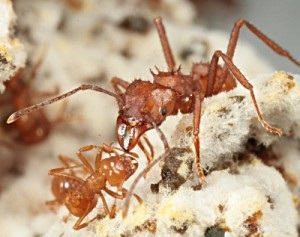Volker Nehring, PhD
Volker Nehring, PhD
University of Freiburg
Biology I, Evolution & Ecology
Hauptstraße 1, Room 1039
D-79104 Freiburg
Phone. ++49/761/203-2584
E-Mail: Volker.Nehring@biologie.uni-freiburg.de
Research interests
Organizing even the smallest social groups demands fine-tuned communication to ensure concerted action. We are interested in the physiological and molecular underpinnings of individual variation in the behaviour and life history of social insects. One focus is on communication and how it affects behavioural variation, for example in nestmate recognition (“who am I cooperating with?”) and fertility signaling (“who gets to reproduce?”) in ants and termites.
Causes and consequences of behavioural variation
The success of groups, in particular of social insects, is driven by within-group division of labour. Allocating different tasks to different individuals allows for individuals to specialize, which improves overall group performance. Behavioural variation can be caused by individuals differing in their intrinsic motivation to act, their memory of the past environment, and their perception of the present environment. We use the ant nestmate recognition process as a model to study the physiology of all three factors, which are by no means independent.
Ants discriminate among friends and enemies based on olfactory cues on the surface of individuals. Our previous work showed that there is significant variation in the nest defence behaviour of ant workers. The variation is caused by variation in both perception of olfactory cues and decision making (should I attack or not?). We study the proximate causes of individual variation on the perceiver side of recognition, with a particular focus on prior experience. Encounters with non-nestmates can alter later behaviour because they change alert states or neuronal templates. We analyse the effects of experience on the molecular regulation of perception and processing of olfactory cues. We manipulate the experience of individual ant workers, and make use of the natural variation in experience among ants of different ages and tasks.
 Fighting Camponotus workers
Fighting Camponotus workersLife history evolution and behavioural variation
We are also interested in the interaction between behavioural variation and life history; individuals that take greater risks often die younger, and as a consequence may be optimised for shorter lives. If these individuals invest less in their own body maintenance, these resources could be better spent in other parts of their colonies.
 Polymorphic Acromyrmex workers
Polymorphic Acromyrmex workersShort CV
- 2020 Habilitation, University of Freiburg
- 2011 PhD, University of Copenhagen
- 2007 Diploma in Biology, University of Freiburg
Publications
For a full list please see https://scholar.google.com/citations?user=G7rg_5YAAAAJ
- Majoe, M., Liebbrecht, R., Foitzik, S., Nehring, V. (2021) Queen loss increases worker survival in leaf-cutting ants under paraquat-induced oxidative stress. Philos. Trans. Roy. Soc. B. doi.org/10.1098/rstb.2019.0735
- Leonhardt, S.D., Menzel, F., Nehring, V., Schmitt, T. (2016): Ecology and evolution of communication in social insects. Cell 164: 1277–1287. doi.org/10.1016/j.cell.2016.01.035
- Nehring, V., Dani, F.R., Turillazzi, S., Bohn, H., Klass, K.-D., d’Ettorre, P. (2016) Chemical disguise of myrmecophilous cockroaches and its implications for understanding nestmate recognition mechanisms in leaf-cutting ants. BMC Ecol. 16: 35. doi.org/10.1186/s12898-016-0089-5
- Nehring, V., Dani, F.R., Turillazzi, S.; Boomsma, J.J., d’Ettorre, P. (2015): Integration strategies of a leaf-cutting ant social parasite. Anim. Behav. 108: 55-65. doi.org/10.1016/j.anbehav.2015.07.009
- Nehring, V., Boomsma, J.J. & d’Ettorre, P. (2012): Wingless virgin queens assume helper roles in Acromyrmex leaf-cutting ants. Curr. Biol. 22: R671-R673. doi.org/10.1016/j.cub.2012.06.038
- Nehring, V., Evison, S.E.F., Santorelli, L.A., d’Ettorre, P. & Hughes, W.O.H. (2011): Kin-informative recognition cues in ants. Proc. R. Soc. Lond. B 278: 1942- HYPERLINK "http://rspb.royalsocietypublishing.org/content/278/1714/1942" \n


